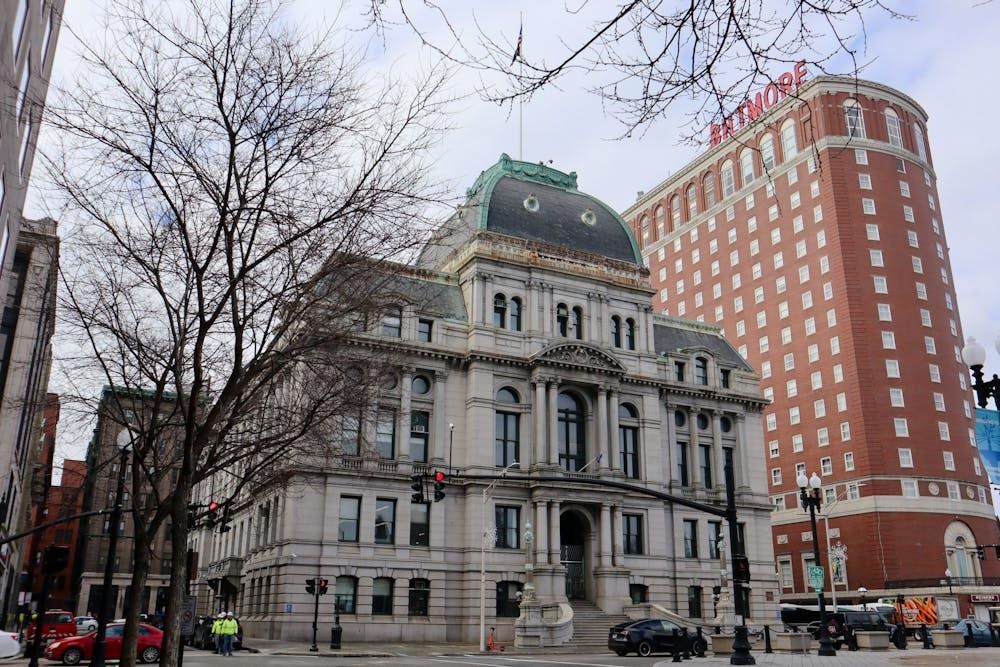On June 6, the Providence City Council heard an ordinance that would prohibit the city from investing its assets in Israeli bonds. The ordinance would also prevent Providence from reinvesting currently held sovereign bonds upon their maturity.
The council “has an ethical and financial responsibility to ensure taxpayer dollars are not invested in war crimes and human rights violations,” reads the ordinance, sponsored by Council President Rachel Miller and Councilors Justin Roias and Miguel Sanchez. The ordinance targets assets in all city investment accounts, including pension, endowment and annuity funds.
Mayor Brett Smiley has said he intends to veto the ordinance if passed. If he exercises his veto, 10 votes are needed to overrule his decision.
Providence is not directly invested in Israeli bonds, but a $7.5 million passive index fund in the city’s pension portfolio holds about $30,000 in Israeli bonds, representing 0.4% of the fund. “An ordinance requiring the divestment of a bond of this size is unproductive, ineffective and possibly violates state law,” the statement reads.
A 2021 presentation to the city’s Pension Working Group estimated that the city held just over $2.3 million in Israeli bonds at that time. The last of these bonds matured in 2022 and was not reinvested, Providence Press Secretary Josh Estrella wrote in an email to The Herald.
The ordinance follows recent calls for divestment at Brown and the Rhode Island School of Design.
In April, student demonstrators at Brown staged an encampment calling on the University to divest from companies with ties to the Israeli military in the war against Hamas and drop the charges against the 41 students arrested in a Dec. 11 University Hall sit-in. The Corporation will hear a vote on divestment at its October meeting, following an agreement between student organizers and University administrators in which activists agreed to dismantle the encampment.
“We support the proposed divestment ordinance and hope Brown sees this as an example,” Brown Divest Coalition Spokesperson Arman Deendar ‘25 wrote in a message to The Herald.
During the encampment, Miller, Roias and Sanchez sent a letter to the City Solicitor urging the office to drop the charges against the arrested students. The students later received a six-month not guilty filing at a May court hearing.
In his statement, Smiley wrote that the ordinance “reeks of antisemitism” and “will only make members of our Jewish community feel further isolated and targeted.” Several Jewish organizations have expressed similar concerns, labeling the proposal antisemitic.
The Jewish Alliance of Greater Rhode Island and the Board of Rabbis of Greater Rhode Island wrote in a letter sent to the Council that “divestment campaigns, which single out Israel for pariah status, are antisemitic and disproportionate.”
While Israel is the only state named, the ordinance would prohibit Providence from investing in bonds of any government “maintaining a prolonged military occupation that have been the subject of United Nations Security Council resolutions and/or International Court of Justice rulings.”
Miller, Roias and Sanchez did not provide The Herald with specific comment regarding claims of antisemitism.
Jewish Voice for Peace Rhode Island organized a “Break the Bonds PVD” campaign in favor of the ordinance. The organization urged individuals to contact their local councilors and “voice support” for the legislation.
JVP-R.I. consists of Jewish community members who are “committed to the Jewish values of tikkun olam (repairing the world), tzedek (justice) and pikuach nefesh (the sanctity of each and every life),” wrote Julian Drix ’08, a JVP-R.I. organizer, in an email to The Herald. “It is because of these values that we believe that our city government should not invest in the Israeli military by investing in Israel Bonds.”
RICI, the Jewish Alliance and the Board of Rabbis also expressed concerns that the ordinance may violate the 2016 Anti-Discrimination in State Contracts Act. The act prohibits “public entities” from contracting with businesses that boycott any firm, public agency, or entity that is open to trade with the state.
The ordinance is under review against the existing state legislation, according to Estrella.
Miller, Roias and Sanchez did not provide The Herald with specific comment regarding the ordinance’s potential violation of state law.
Councilor John Goncalves also pushed back against the ordinance, arguing that “engaging in foreign policy, particularly through complex financial mechanisms such as this, is beyond the council’s purview,” he wrote in a letter to his peers who sponsored the legislation.
“Local government resources and efforts are better directed towards pressing local concerns where the council can make a tangible impact,” Goncalves wrote.
Goncalves did not respond to The Herald’s request for further comment.
Roias responded to Goncalves’ concerns via X, arguing that local governments and institutions “have a moral duty to reflect their values in their investments.” He highlighted the council’s similar 2006 ordinance divesting from businesses affiliated with Sudan during the Darfur genocide. Providence was the first U.S. city to pass a divestment ordinance targeting Sudan, voting 13-0 in favor.
In 2013, the council also voted in favor of an ordinance divesting city assets from the top 200 fossil fuel companies, The Herald previously reported. Providence was the country’s first capital city to divest from the fossil fuel industry.
In November, the council passed a resolution urging the state’s federal delegation and President Biden to call for a ceasefire in Gaza, The Herald previously reported. The ceasefire resolution passed with an 11-1 majority. The Jewish Alliance opposed the resolution, while RICI sent a separate letter to the congressional delegation denouncing a ceasefire.
The ordinance has been referred to the council’s Finance Committee for consideration.

Tom Li is the editor-in-chief and president of The Herald's 135th editorial board. He is from Pleasanton, California and studies economics and international and public affairs. He previously served as a metro editor, covering the Health & Environment and Development & Infrastructure beats, and has worked on The Herald's copy editing, editorial page board, design and podcast teams.





